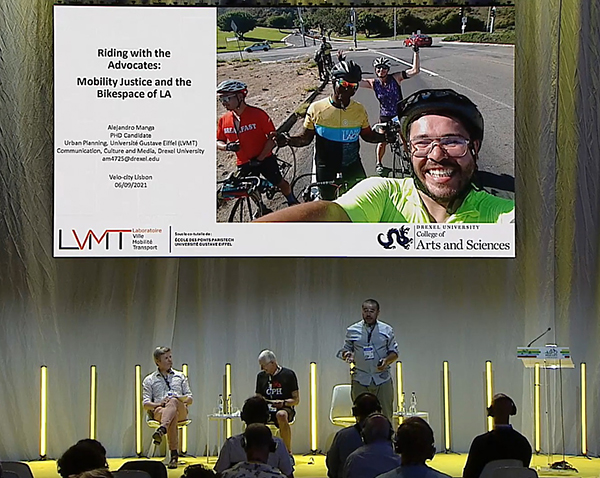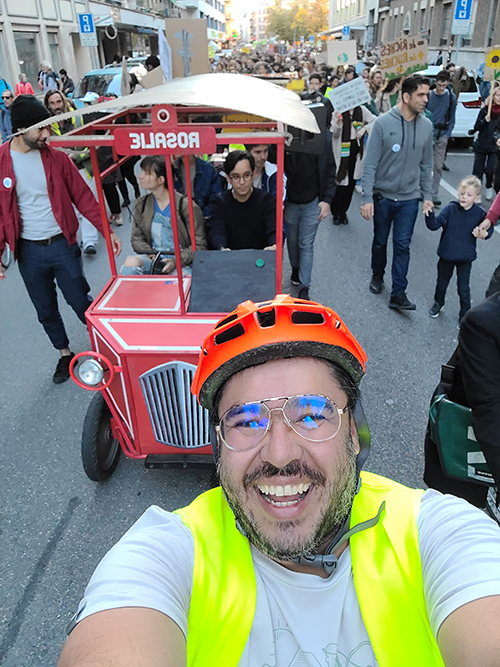PhD Student Alejandro Manga Examines Role of Bike Movements in Ecological Transition
By Gina Myers
January 26, 2022
Riding a bicycle can bring up many emotions for people. Perhaps those emotions relate to a happy memory of childhood, or maybe they evoke the feeling of the wind blowing through one’s hair.
Cycling can also evoke negative emotions—perhaps someone has experienced a bad accident or has felt fearful that riding would be unsafe. Some may have felt excluded from cycling due to their social or economic situation.
As planners across the globe look to increase cycling as a mode of transportation in the face of climate change, Communication, Culture and Media (CCM) doctoral student Alejandro Manga argues that these emotions are important to address.
“The emotional aspect of cycling is very important. When you have someone telling you that they will not cycle because they feel threatened, that is an emotional response,” he explains.
 Manga presents his research at Velo-city Lisbon. Velo-city is the largest cycling conference in the world.
Manga presents his research at Velo-city Lisbon. Velo-city is the largest cycling conference in the world.
In a recent article on bike kitchens, which are places where people can learn safe cycling, repair bikes, build community and more, Manga and his co-authors write, “Cycling reduces greenhouse gas emissions, brings myriad health benefits and reduces traffic. But urban planners and policymakers often struggle to get more people on bikes. To increase urban cycling, we need more than extra cycling infrastructure; we need a culture change.”
This culture change comes from the ground up, from places like bike kitchens and cycling advocacy groups to other communities of riders. And this culture change is at the center of Manga’s dissertation on the role of bike movements in ecological transitions, which seeks to “perform a comparative analysis of biking mobilizations in France and the USA and to question their role in the social, political and environmental transformation of the spaces in which they emerge.”
Manga’s interest in this is both professional and personal. As a child growing up outside of Bogotá, Colombia, Manga would bike about 10 miles into the city to go to school. The newly built bicycle paths he rode instilled a sense of community pride in him and changed the way that he saw the city, which previously had been blemished by war and the drug trade.
After studying economics and working in consulting firms using hedonic pricing and other tools to study the relationship between Transit-Oriented Development (TOD) and land values, among other things, Manga left the field to open a restaurant with a friend. Following the closing of the restaurant, he decided to return to graduate school to study urban and regional planning at the University of Geneva and development economics at the University of Grenoble-Alpes.
Returning to grad school made him conscious of his lifestyle and the cost of living, so he began cycling again. When his girlfriend’s bike broke and it was too costly to have it repaired, Manga decided it was time to learn how to do repairs himself. He discovered a bike kitchen in their town where he learned to do the repairs. Bike kitchens, Manga explains, “offer tools, secondhand parts and bikes, and convivial help with repairs. They are also hubs for community development.”
Manga joined the community at the bike kitchen before being invited as a Visiting Graduate Researcher to UCLA by Leo Estrada, PhD, an urban planning scholar, to UCLA, where he was supposed to conduct research on Hispanic community participation and city council. But a chance encounter with someone working at UCLA’s International Center for Scholars introduced him to cycling in Los Angeles.
“It was Bike Week at UCLA, and they invited this organization called People for Mobility Justice. I listened to their talk, and I was hooked,” Manga explains. “I knew I wasn’t going to work on city council now, and I began doing research on mobility justice and cycling.”
This new interest in mobility justice led him to the work of Mimi Sheller, PhD, formerly of Drexel and now dean of The Global School at Worcester Polytechnic Institute. Through conversations with Sheller, Manga decided to pursue his doctorate in Communication, Culture and Media at Drexel.
 Manga rides in front of "La Rosalie" (The Bikebus) with friends and members of Bicyclette Bleue, a community organization he co-founded in Geneva, during the March for the Climate.
Manga rides in front of "La Rosalie" (The Bikebus) with friends and members of Bicyclette Bleue, a community organization he co-founded in Geneva, during the March for the Climate.
Manga is now pursuing a dual degree in Urban and Regional Planning at the Laboratory of Cities, Mobility and Transportation (LVMT) at the University Gustave Eiffel in Paris, France.
Combining his economics and urban planning background with communication, culture and media gives Manga a unique perspective. As he learned about analysis, persuasion, visual anthropology and translation, Manga arrived at a realization.
“Learning this stuff made me think about the way we make public policy. We tend to think with policy that we have rational actors and rational decision making, but that is not true. People work with pathos and ethos. If you want to do public policy, you need to persuade,” he says.
He also notes the importance of using language appropriate for its audience. “In mobility justice and transportation justice, there are scholars that come from gender studies or cultural studies or anthropology, and they use language that is inaccessible for planners and transportation people.”
In contrast, Manga explains, “in planning school and transportation studies, they look at numbers and not situated knowledge: What are people’s perspectives? How do they move in space? How do you experience a city, for example, driving while Black or as a woman being catcalled? This isn’t about numbers—it’s about understanding people, the things they experience and what they must consider before making a decision.”
Considering the audience and context is essential for messaging. “There’s mediation and translation of technical concepts. Are you talking to engineers, a mass audience or activists? Am I talking about these issues in the United States, or in Europe, or in Latin America? It is not the same in each location.”
In a recent chapter for The Cycling Companion, Manga and Simon Batterbury, PhD, associate professor at the University of Melbourne, write about how key aspects of the culture of bicycle mobility respond to particular social needs across race, class and gender, and also create a broader demand for cycling.
They argue, “A just urban mobility begins on the streets and in bikespaces” and conclude, “People are prepared to join together to struggle and fight for safer and less polluted roads, better access to public space and to battle the culture of automobility that still dominates most western cities and the global South.”
The authors write, “The remaining question for those interested in this heady mix of bicycle assemblage, planning and protest is how best to bring about the sustainable mobility transitions that cities deserve and need, while involving those excluded from urban and transport planning.”
This is a question that Manga—with one foot firmly in academia and the other in bike activist communities—is sure to continue to dedicate himself to answering.